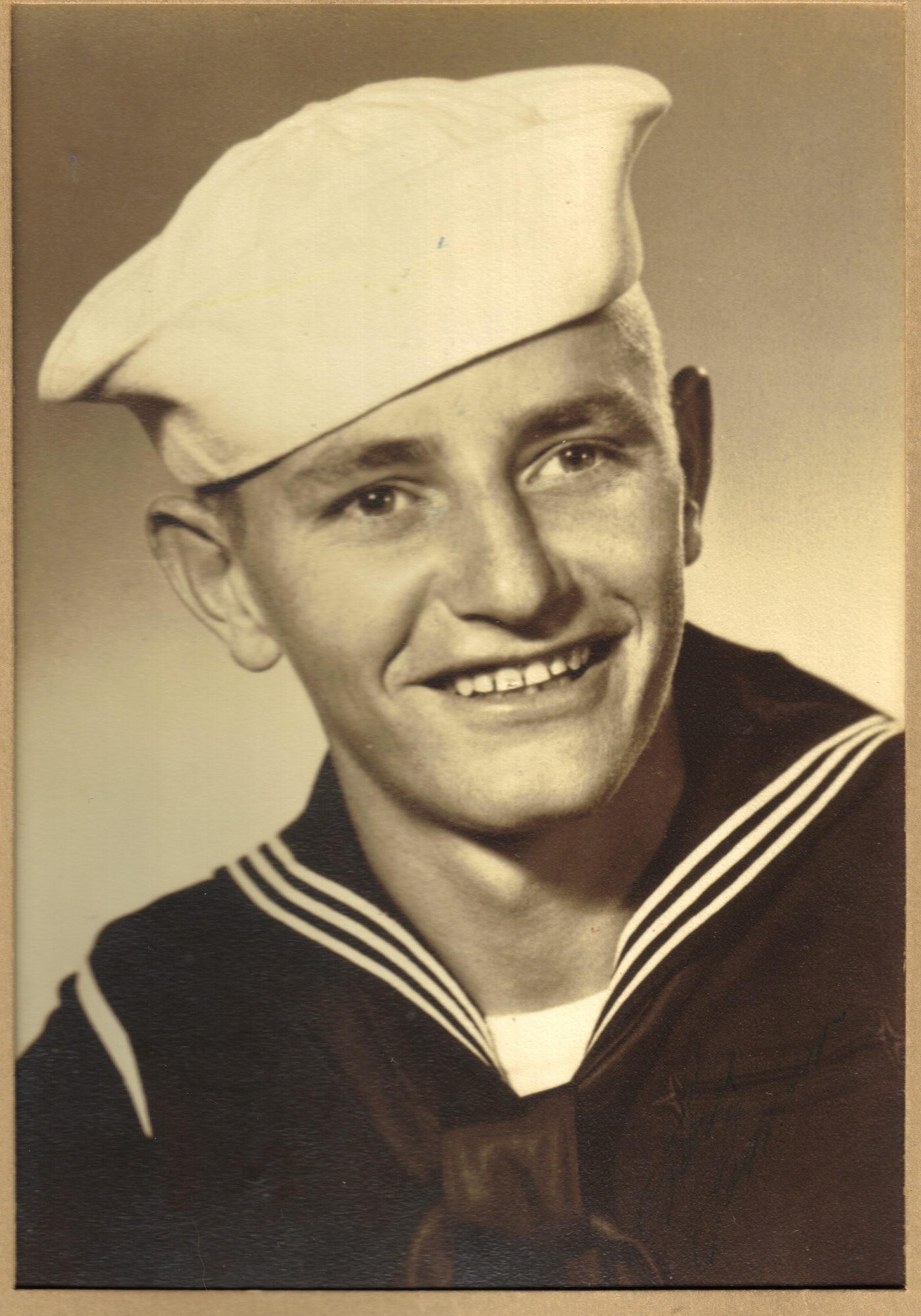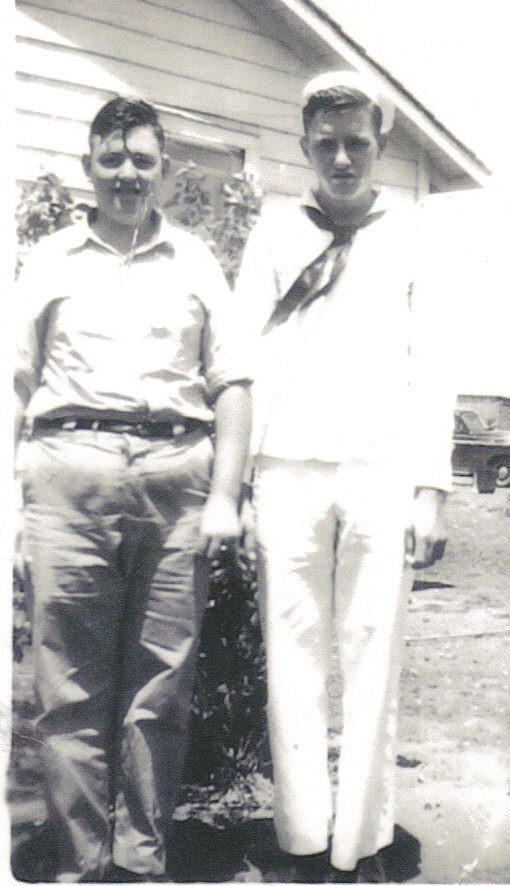Loman Johnston


Loman Johnston was born on July 31st, 1927 in Earlsboro Oklahoma. He was born to his parents C.W. and Ethla Johnston. Loman was the third of six children, with 4 brothers and 1 sister. In his early years, Loman moved with his family around the Midwest, from Earlsboro, Oklahoma to Arkanas, to Odessa, and then finally settling down in Natalia, Texas. After completing the 10th grade (because Natalia ISD only went to 10 grades.) Loman enlisted in the Navy in 1944 at 17. After serving in World War 2, he returned from the Pacific and finished high school in Lytle Texas in 1946. Into 1947 he began his career as telephone line repair man, and worked for Southwestern Bell for 37 years; he was also a volunteer firefighter and fire chief of Uvalde. On May 13th, 1949 he married his wife, Mrs. Cora Johnston; and settled down in San Antonio. They have two children, G.W. and Cindy. They also have 6 grandchildren and 4 great grandchildren. After retiring in 1984, Loman spends much of his time with his family and doing woodwork. Mr. Loman Johnston is my next door neighbor.
What branch of service did you go into? Why did you chose that particular one?
We ended up going into the Navy because we both figured we wouldn't have to walk all the time like the Army and Marines had to.
When you joined, what was your perception of the military and war? Was it how you imagined it would be?
I had no idea what it was going to be like. I really didnít think much about it, because I knew whatever happened was going to be a first time for me.
Where were you stationed? What was your post like?
Me and Mack shipped out of San Diego on the USS New York, when it was ordered to return to the Atlantic most of us got dropped off at Pearl [Harbor]. Me and Mack were together until then, after 3 days of liberty at Pearl, I was assigned to the LCS (Landing Craft Support boat) 44. We left for the Pacific and I didnít touch land for 14 months. My Friend Mack became a chauffeur for a Colonel and never left Pearl.
Could you describe a typical day at your station assignment?
During the day we transported Marines to the beaches and offered artillery and fire support from the boats; my memory escapes me as to the details, but I remember it was scary as hell. At night we mostly just kept night watch.
What kind of meals did you have?
It was a big boat, so we had everything we needed with cooks and meals. Each man got 4 beers a week and as much Coke as you wanted. I didnít drink back then so I drank a lot of Coke, but when it was all gone I just switched over to beer.
What was your job? What kind of duties were you assigned to do?
I was a fire controller, so I manned a Quad 40 at my battle station. (A ďQuad 40" is a 4 barrel, 40 caliber Machine Gun.) My favorite time with that was target practice, when they would fly little model airplanes off the boat and we would shoot at them. I never could hit the damn things though. And I remember the first day we got on the LCS 44. Me and another fellow had to clean all the emergency fire equipment, like the hoses and hydrant openings and things like that. That night in the mess my XO came down and told me we were going to have a Night Combat Simulation and I was assigned to fire controller. At the time, I didnít know a fire controller meant that I manned the Quad 40 so when the alarm sounded that night, I ran to the back of the boat and got a fire hose and I was ready to fight fire. Thatís what I thought being a fire controller was. Man, you want to talk about an ass chewing...after that I always asked questions.
![Loman Johnstan Tsingtao China 1944 [note: refer to Tsingtao link below]](tsingtao closeup.jpg)
Were you ever in a combat situation?
No I was never in a combat situation We did Fire Support from the boats for the Marines landing on the beach, but two of my brothers were. My brother Frank was in the Army and was killed in action at the Battle of the Bulge in Europe. My younger brother Ray, was assigned to the USS Long in the south pacific and escaped twice from ships that were attacked and sunk in battle. Frank is buried in France at the National Cemetery there; I never did get the chance to go and see him after the war.
Did you establish any close relationships in the military? If so, do you still keep in touch?
I had friends on the boat, but we never did keep in touch. I still wrote to Mack at Pearl and he wrote back to me. I did run into a boy I went to school with in Odessa serving on the LCS 31. Me and him both had back between the 31 and 44 a few times and never ran into each other.
What did you do for entertainment?
Since we couldnít leave the boat, we spent a lot of time playing poker or just cards.
What was it like to communicate with people back home? Who did you keep in contact with?
You could only keep in contact by letter, I only wrote to my mom and dad, and Mack. It took letters a few weeks to go back and forth though.
When you returned home, did you return to the same occupation you had when you left?
When I left for the war, I had only completed the 10th grade because the school in Natalia only went up to 10 grades. When I returned from the war I went back to high school and got my diploma.
Did you consider making a career out of the military after the war? why or why not?
At the time I didnít, but looking back I wish I had. When we got back home, and I was decommissioned a few fellows there tried to get me to sign up for more service. And if I gave one guy an answer another one would come talk to me and then another. I would have signed back up but they came at me the wrong way. These guys just seemed kind of fishy so I told them no thanks.
Do any particular memories stick out in your mind from your experience?
I remember once when we had come into port to drop off a load of Marines; we were told not to leave the boat. But that night me and a friend of mine sneaked off the ship and went into town. When we came back early in the morning our XO [Executive Officer] was standing on deck waving at us from the peer. Since we were already in trouble and we knew it, we just waved back and spent the day in town. Unfortunately when we returned later that day, our boat had already left and we ended up having to jump boats to make it back to Tsingtao . [laughing] It took us almost a month to get back, I did 20 days in the Marine brig.
What was your rank?
I was a seamen first class, [laughing] and I guess I was a seamen 3rd class for a little while too when I did my time in the brig and they cut my pay.
What kind of inconveniences did you run into?
I don't think I had any inconveniences, everything we needed was always on the ship. Just being on the ship for 14 Months was hard.
What kind of personal items did you keep with you? (i.e. pictures, bible, etc.)
I just kept a couple of photographs and the letters I got, other than that I didnít keep much with me.
Is there anything else in particular that you remember or would like to add?
The whole thing was a lot of experiences for me, but I remember in basic when we did our laundry, you had to do your own laundry then, you would have to take a piece of rope and run it through the clothes and tie it off with a square knot. It couldnít be any other knot and I messed it up a couple of times so my drill instructor had the entire company march over my clothes. I learned real quick after that.

American Battle Monuments Commission Is an online database of memorials and cemeteries as well as links and listings of names of the soldiers buried there. It was created and compiled by the American Battle Monuments Commission and is an independent branch of the executive government. Accessed: March 16, 2005.
Dictionary of Naval Fighting Ships is an online collection of information on U.S. Naval fighting ships throughout history. It was developed by Office of the Chief of Naval Operations Naval History Division. Last Updated: Feb. 10 2005.
Hyper War:U.S. Navy in World War II this website contains information and links on the Navy During World War II. It was compiled by Patrick Clancey with the HyperWar foundation. Last Updated: Feb. 14, 2005.
Northpark University Chicago,History Dep. this is a chronological outline of the Battles of World War II along with other world history events. this was produced and copyrighted (1996-9) by David Koeller and Northpark University in Chicago. Accessed: March 15, 2005.
The Handbook of Texas Online is a multidisciplinary encyclopedia of Texas history, geography, and culture sponsored by the Texas State Historical Association and the General Libraries at UT-Austin. It was produced in partnership with the College of Liberal Arts and the General Libraries at the University of Texas at Austin. Copyright © The Texas State Historical Association. Last Updated: May 6, 2004.
Wikipedia Online Free Encyclopedia is a multidisciplinary encyclopedia written collaboratively by people from all around the world. It is a trademark of Wikimedia Foundation, Inc. Last Updated: Apr. 10, 2005.